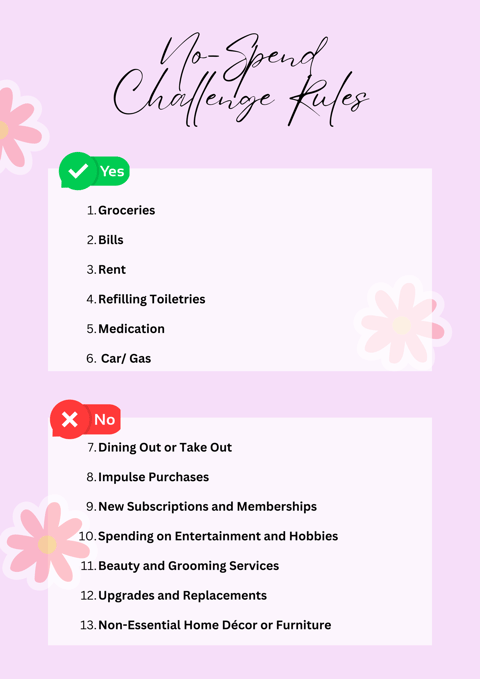The Two-Week No Spend Challenge: Transform Your Finances and Boost Your Savings
A No-Spend Challenge is a great way to reset your finances and gain control over your spending habits. This challenge focuses on limiting expenses to only essentials like bills, groceries and transportation, while avoiding non-essentials like dining out, shopping and entertainment.
BUDGETING
Ken
1/15/20253 min read
Disclosure: This post contains affiliate links. If you click on a link and make a purchase, I may earn a small commission at no extra cost to you. Thank you for supporting my blog.
In today's world where spending is often a click away, it can be easy to lose track of where your money is going. I am sure that we are all guilty of impulse buying something online from time to time or grabbing a few extra things from the store that weren't needed. These small expenses can quickly add up.
A few months ago I came across a No-Spend Challenge and loved the idea. I initially tried it for a week and was successful. I even attempted to extend it to a month, but I found that unrealistic for me. The sweet spot turned out to be two weeks.
So, what is a No-Spend Challenge?
A no-spend challenge is when you commit to not spending money on non-essential items for a set period of time. The goal is to spend only on things that are absolutely necessary- like rent, utilities, and groceries- while eliminating discretionary spending. A no-spend challenge is a great way to help you take control of your spending and reassess your financial priorities. After two weeks, you may feel more empowered to keep your spending in check. You might continue to carry forward some of the habits you've developed, such as meal prepping or avoiding unnecessary shopping trips.
What Expenses are Allowed?
The goal is to reduce unnecessary purchases but still cover your basic needs. Here’s a breakdown of what you can spend money on during the challenge:
Essential Bills: Your monthly rent or mortgage, utilities (electricity, water, gas), and insurance are all necessary and non-negotiable. Keep paying these to avoid service interruptions.
Groceries: You can still buy food, but try to stick to basics. Avoid eating out and focus on preparing meals with what you already have in your pantry. Meal planning is key here.
Transportation: If you need to use public transport or buy gas to get to work or appointments, this is still considered an essential expense.
Medicine and Health Needs: Prescriptions or health-related purchases that are necessary for your well-being should still be accounted for.


What Expenses are NOT Allowed?
Now comes the part where you get to challenge your habits and resist the urge to buy things you don’t need:
Dining Out: Avoid restaurants, fast food and coffee shops. This includes ordering takeout or delivery. If you usually get lunch at work or a snack on your way home, opt for preparing meals and snacks at home.
Online Shopping: No impulse buys! That includes clothing, gadgets or even the small "add-to-cart" items that you might justify as necessary. Avoid any non-essential online subscriptions or memberships aw well.
Entertainment Expenses: Skip going to the movies, concerts or other paid entertainment. Look for free alternatives, such as a hiking, reading a book or watching something on a streaming service you already subscribe to.
Unnecessary Services: Don’t sign up for new subscription services such as beauty boxes, meal kits or fitness memberships. This is the time to evaluate what you truly use and need.
How to make it work:
Plan Ahead: Before you start, set some clear goals for your challenge. Write down your reasons for doing it and what you want to achieve. This will help you stay motivated.
Stock Up on Essentials: Make sure you have enough food, toiletries and other essentials to last for two weeks. The last thing you want is to find yourself scrambling for something you need halfway through.
Track Your Spending: Keep a journal or use an app to track your spending during the challenge. You might be surprised by how much you’re saving.
Find Free Activities: Plan activities that don’t involve spending money. Go for walks, read a book, do a DIY project or enjoy time with friends and family in creative ways.
Accountability: If you’re finding it difficult to stay on track, consider involving a friend or family member to hold you accountable. Sharing the experience can make it more fun and motivating.
A 2-week no-spend challenge is not just about saving money; it’s about taking a step back and reassessing your financial habits. It’s a chance to reflect on what you really need versus what you want in the moment. The discipline you gain from this challenge can extend far beyond the two-week period and can help you make more thoughtful, intentional financial decisions in the future. By the end of the challenge, you’ll have more money in your savings, a sense of accomplishment, and a clearer view of what you truly value—your wallet and your peace of mind will thank you.

Explore tips for productivity and self-care.
© 2024. All rights reserved.
